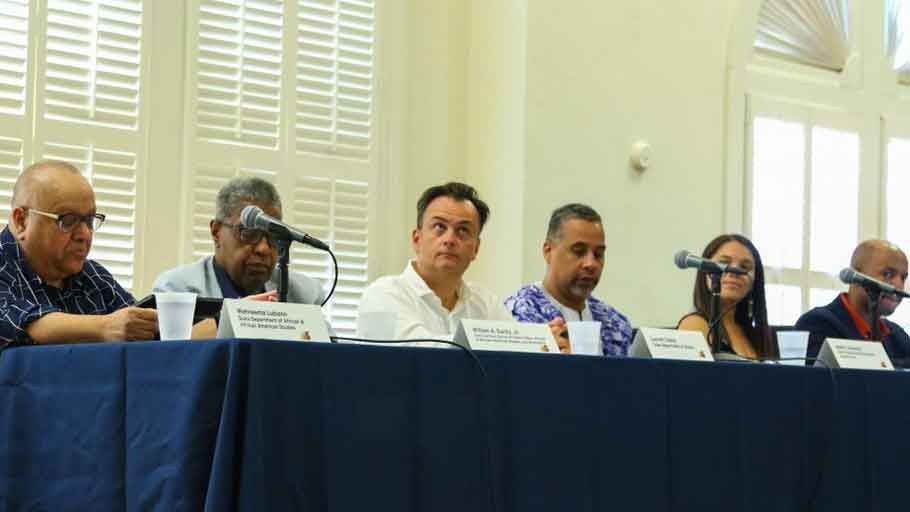Photo by The Chronicle
Scholars tackle the topic at Duke U. panel
By Xinchen Li, The Chronicle —
Reparations for African Americans are crucial to fight white supremacy and compensate for slavery’s consequences, scholars said at a town hall forum Monday, but they aren’t enough.
Racial inequality and discrimination are so engrained in diverse aspects of the American society that no single measure would solve all the problems, said Wahneema Lubiano—associate professor of African and African American studies—at the panel. Reparations are usually discussed in the form of monetary payments to individuals or land-based compensations to communities.
“Sometimes we talk in a way in which the word ‘reparation’ acts as a singularity,” Lubiano said. “Whereas in fact, it is a complicated set of multiple possibilities, multiple sites, multiple stages and multiple actors.”
Lubiano cited the history department’s recent request to rename the Carr Building on East Campus, for example, as one way Americans could reflect on the history of slavery and redress its victims, aside from material compensation.
One projection for the cost of monetary reparations is between $5.9 and $14.2 trillion, according to a 2015 study at the University of Connecticut.
Racism is more profound than slavery and its legacy, said William “Sandy” Darity, panelist and Samuel DuBois Cook professor of public policy. It is most fundamentally manifested in the economic disparity between races, such as disparities in employment rate and educational opportunities, he argued. The median of white families’ incomes is still higher than that of black families overall, Darity said.
Darity notes that the movement to “Bank Black and Buy Black”—a movement that encourages African Americans to channel together their assets to create jobs and build businesses—will not address the ongoing wealth inequality.
Black firms and institutions are usually much smaller and less profitable than their counterparts owned by white Americans, he explained.
“This is not because black-owned institutions lack strong business models or lack wise leaders,” Darity said. “It’s because the inherited economic situations of the communities where they operate make it hard for start-ups to develop.”
For example, black families usually have minimal liquid assets, Darity explained.
African Americans’ appeal for reparations for slavery echo with similar appeals around the globe, said Laurent Dubois, professor of history, at the panel. In 2013, 5,000 Kenyans received a 20 million pounds in reparations from the British government as a compensation for the country’s brutal colonial rule in the 1950s.
From a legal standpoint, standing and redressability are issues that have prevented reparations from becoming reality, said Malik Edwards, panelist and law professor at the North Carolina Central University.
In this context, the African American community needs to demonstrate that the negative impact of slavery is ongoing and that there is a concrete form of remedy the court is able to offer, he said.
After the Civil War, Union General William Sherman infamously promised reparations for slavery in the form of “forty acres and a mule,” Edwards said. That never came true.
Economics and political science graduate student Amber Hendley has recently conducted a counterfactual study remapping the American landscape according to General Sherman’s original promise. She also calculated approximately how much African Americans would gain financially from the land.
“If we have been given what was stated,” Hendley said. “I do not believe we would have the problems we have today.”
As essential as reparations are, they cannot compensate for all the sufferings slaves and their descendants have undergone, said Joseph Winters, assistant professor of religious studies and African American studies.
Slaves suffered from psychological and mental hardship throughout the American history, which cannot be quantifiable, Winter said. And nowadays, African Americans still encounter stigma and lack a full recognition of citizenship and a sense of home, he added.
The event, called “Reparations Now? Looking at Racial Wealth Inequality in a Time of Authoritarianism,” was sponsored by the department of African and African American Studies.
Although Lubiano noted the limitations of reparations in narrowing the social and economic gaps between races, she also said that attempting to carry out reparations opens up valuable discussions and debates across social stratums.
“Reparations offer us opportunities to do things that we don’t usually do—which is to talk to each other horizontally despite the existing vertical hierarchy,” Lubiano said. “And it appears to me to be so important that it is worth the risk of failing.”
Also See — ‘Don’t want to let schools off the hook’: Considering reparations in higher education















